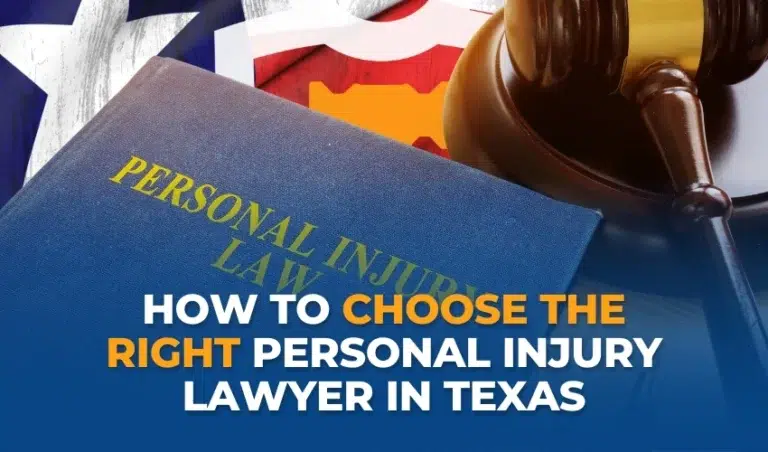When you have been injured due to someone else’s negligence, choosing the right personal injury lawyer can feel overwhelming. You might be dealing with medical bills, lost wages, and the uncertainty of how to move forward. The legal process can be complex, and the attorney you choose will play a key role in guiding you through it. A lawyer handling personal injury cases can explain your legal options and help you handle the claims process.
If you’re looking for a personal injury lawyer in Texas, you may have already come across many options, but the challenge is finding the right attorney for your situation. Personal injury law covers a range of cases, and making an informed decision can affect the outcome of your claim.
What Should You Know About Personal Injury Law in Texas?
Personal injury law in Texas is designed to provide a path for individuals who have been harmed due to someone else’s actions or negligence. If you’ve been injured in a car accident, workplace incident, or by a defective product, you may have the right to seek compensation. However, Texas law has specific rules that may impact your case.
Texas follows a modified comparative negligence system. If you are found to be 50% or more at fault, you cannot recover damages. However, if you are less than 50% at fault, you may still be able to seek compensation, but the amount you recover will be reduced by your percentage of fault. For example, if you are found to be 20% responsible for an accident, your compensation would be reduced by 20%. Insurance companies often try to shift as much blame as possible onto the injured person to reduce or deny claims. This is one of the reasons why having legal representation can be important when dealing with a personal injury case.
Texas also has a two-year statute of limitations for personal injury claims. In most cases, this means that a lawsuit must be filed within two years from the date of the injury. There may be exceptions depending on the circumstances, but missing the deadline could mean losing the ability to file a claim.
What Qualities Should You Look for in a Personal Injury Lawyer?
Not every lawyer who handles personal injury cases has the same background, and finding the right fit is important. One key factor to consider is whether the lawyer has handled cases similar to yours. Personal injury law covers a wide range of claims, including car accidents, product liability, and wrongful death. Some attorneys may focus on certain types of cases more than others.
Knowledge of Texas laws is another important factor. Personal injury laws can vary from state to state, and having an attorney who understands the laws and procedures in Texas can be helpful. This includes familiarity with local courts, legal strategies, and how insurance companies in Texas approach claims.
Trial experience is another consideration. While many personal injury cases are resolved through settlements, there are times when a case may need to go to trial. Insurance companies may be more likely to negotiate fairly when they know a personal injury attorney is prepared to present a case in court if necessary.
Communication is also an important part of the legal process. When pursuing a claim, you’ll want to work with a lawyer who provides clear updates and explains legal concepts in a way that makes sense. The legal system can be complex, and having a lawyer who is responsive and communicative can make the process easier to navigate.
Most personal injury attorneys work on a contingency fee basis, meaning they only collect legal fees if they obtain a recovery on behalf of their client. It’s important to understand how contingency fees work and any other costs that may be involved in a case. A lawyer should be transparent about their fees and explain any potential expenses before moving forward.
Are There Any Warning Signs That a Lawyer Might Not Be the Right Fit?
While many personal injury lawyers are dedicated to their clients, there are certain red flags to watch for when choosing legal representation. If a lawyer makes promises about the outcome of your case before reviewing the facts, it may be a sign to proceed with caution. No attorney can predict an exact result, and ethical lawyers will not make guarantees.
Transparency about fees is another important factor. If an attorney does not clearly explain their contingency fee structure or additional case-related costs, it could lead to misunderstandings later. A trustworthy attorney will ensure that clients fully understand the financial aspects of their case.
Some law firms take on a large number of cases but may not have the resources to give each client the attention they need. If a lawyer is difficult to reach, does not return calls, or does not provide updates, it could be a sign that they may not have the availability to handle the case properly.

What Questions Should You Ask Before Hiring a Lawyer?
Before choosing a personal injury lawyer, asking the right questions can help you make an informed decision. Consider asking:
- What types of personal injury cases do you typically handle?
- Have you handled cases similar to mine before?
- How do you approach settlement negotiations and trials?
- What is your fee structure, and are there any additional costs I should be aware of?
- How often will I receive updates about my case?
What Can You Expect From the Legal Process?
The first step to filing a personal injury claim is an initial consultation, where the attorney will review the details of your case and discuss your legal options. This meeting allows the attorney to assess the potential strengths and challenges of the claim.
Once a lawyer takes on a case, they typically begin an investigation. This can involve gathering medical records, speaking with witnesses, reviewing accident reports, and consulting with industry experts. The goal is to build a strong case by collecting the necessary evidence to support the claim.
Negotiations with insurance companies are often a key part of a personal injury claim. Insurance companies may offer a settlement, but the initial offer is often lower than what a case is truly worth. Attorneys negotiate with insurers to seek fair compensation based on the extent of the injuries, medical costs, and other damages.
If a settlement cannot be reached, the case may proceed to litigation. A trial involves presenting evidence, questioning witnesses, and making legal arguments before a judge or jury. While trials can take time, they may sometimes result in a higher compensation award than what was initially offered in settlement negotiations.

Why Does It Matter If Your Lawyer Is Based in Texas?
Working with a personal injury lawyer based in Texas offers several advantages. State laws, legal procedures, and court rules vary, and an attorney familiar with Texas law is more likely to understand the nuances that may affect a case. Texas-based attorneys also have experience dealing with local insurance companies, which can be beneficial when negotiating claims. Insurance companies often have different tactics depending on the state they operate in, and working with a lawyer who understands these strategies can help when pursuing a claim. Additionally, lawyers who regularly practice in Texas courts may have insight into local judges and opposing attorneys. This familiarity can help when developing legal strategies and anticipating potential challenges in a case.
Choosing the right personal injury lawyer is an important step in protecting your rights and seeking fair compensation. Understanding what to look for and what to avoid can help you make a well-informed decision when selecting legal representation.






